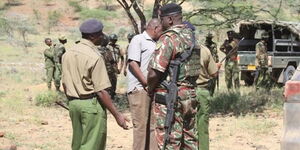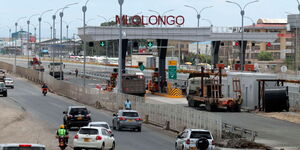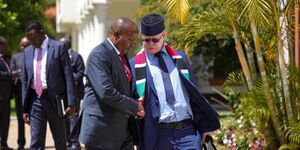The Government of Kenya has broken its silence on the conflict between Israel and Iran, as reports of a potential war between the two countries continue to emerge.
In a statement, Foreign Affairs Principal Secretary Korir Sing’oei called for the restoration of peaceful relations between the two nations, following Israeli air strikes that killed senior Iranian military officials earlier today.
Sing’oei, speaking on Friday, June 13, averred that the Kenyan government was keenly following the developments in the Middle East, noting they had voted in favour of the adoption of a resolution calling for a permanent ceasefire on the war in Gaza, in which Israel is involved.
“We are following with deep concern the escalating situation in the Middle East that has the potential to spiral out of control with grievous implications for regional and global peace and security,” he stated.
“We urge Israel and Iran to exercise restraint and seek a peaceful resolution to the prevailing challenge that has triggered the current escalation in line with the Charter of the United Nations,” Sing’oei noted.
The PS also seemingly sent a cryptic message to the United Nations Security Council, which consists of Israeli allies such as the United States, calling for a unified approach in handling such matters.
“The conflict is a clear reason why we need a UNSC that functions and acts in the best interest of all,” Sing’oei noted.
The latest developments reflect growing international alarm over a potential Israeli strike on Iran, supported by a New York Times report from today indicating that U.S. and European officials believe Israel is preparing an imminent attack, prompting the evacuation of American military families from the region.
Recent estimates from the International Atomic Energy Agency, cited on the nuclear programme page of Iran, suggest that Iran could produce enough weapons-grade uranium for a nuclear bomb within a week. This has intensified global pressure and reinforces Sing’oei’s call for UN Security Council reform to manage such crises effectively.
This comes amid reports that Iran might be planning a counterstrike, with United States President Donald Trump warning that far more lethal strikes on Iran are yet to come.
“I gave Iran chance after chance to make a deal. I told them, in the strongest of words, to 'just do it,' but no matter how hard they tried, no matter how close they got, they just couldn't get it done.”
He added: “The United States makes the best and most lethal military equipment anywhere in the world, by far, and Israel has a lot of it, with much more to come and they know how to use it.”
The Israel-Iran conflict traces back to the 1979 Iranian Revolution, when Iran shifted from a nominal ally of Israel to a staunch adversary under its new Islamist government. Iran’s support for groups like Hezbollah in Lebanon, Hamas in Gaza, and other proxies across the Middle East has long been a source of friction.
Israel, viewing Iran’s nuclear ambitions as an existential threat, has conducted covert operations, assassinations, cyberattacks (e.g. Stuxnet), and strikes on Iranian assets in Syria, while Iran has retaliated through proxies and occasional direct missile attacks.












